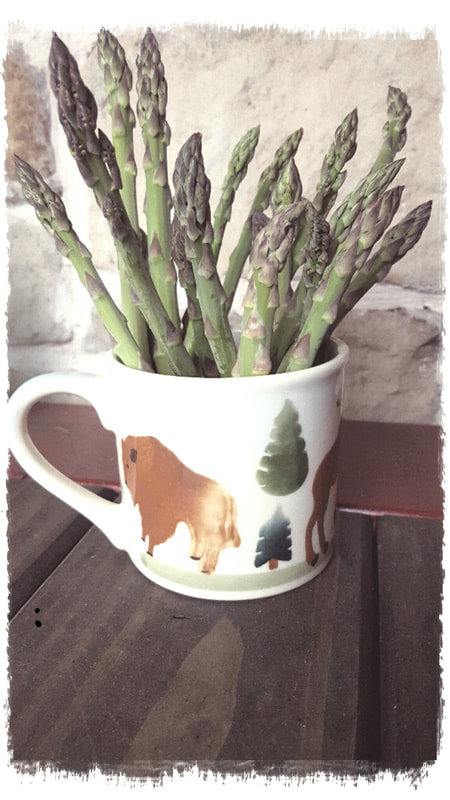
First fruits (okay, vegetables) of gardening this year!
I’m not sure why so many people think asparagus is hard to grow. It isn’t. Maybe it’s because it can be so dang expensive in the grocery store that people just assume it must be hard. Or maybe it’s the patience factor….. because planting it means you MUST wait for several years (at least 3) before getting good bounty if you want a sustainable crop.
Oh, you can plant it, and get a few stalks the first year you plant it…. but if you harvest all that grows, you deny the root system the energy it needs. That part we snap off and eat? That’s what supplies the roots (technically called rhizomes) with energy. Remember in elementary school all you learned about chlorophyll? The green upper part is what helps turn sunlight into energy for the plant. If you always harvested 100%, eventually the root system would die off and you’d have to start over again. For this reason, we let about 50% of our crop reach full maturity so that we feed the root system in anticipation of next year’s harvest.
In some areas of our garden it actually has the weed quality about it…. (ie: a plant growing in an undesirable location) now. And in some parts of the country, it actually grows wild in bar ditches. It is a great foraging food if it’s in your area (provided foraging doesn’t include raiding your neighbor’s garden at midnight ;)!
Asparagus is interesting and rather amazing. It literally grows inches every day during growing season. To make sure you are able to get to it before it gets woody, you really have to check your plants twice a day, or you might as well let them leaf out because it may be stringy and tougher than you like.
Asparagus is loaded with health benefits…
- it’s a natural diuretic
- it’s loaded with antioxidants (antioxidants are what combat free radicals… free radicals are largely what cause dysfunction and disease within our bodies)
- it’s loaded with Vitamin E, B6, K, and Folic Acid (4 stalks of asparagus/day will provide 22% of your daily requirement!)
- due to specific minerals and amino acids there is merit to adding it to your breakfast meal if you had too much to drink the night before. (who knew??)
- it combats bloating thanks to its work as a prebiotic (prebiotics feed probiotics… the good gut bacteria)
- as an aphrodisiac (there is science behind this folks!)
- Because of its vitamin and tryptophan content, adding asparagus to the diet regularly may help with depression or simply to improve mood. (I’m telling you, true food is a healing agent!)
Store bought asparagus is no substitute for fresh picked in terms of flavor. Fresh picked is sweeter and more tender. Many stalks never make it beyond the garden as I eat it straight-away… picked as a snack! People who say they don’t like asparagus (kids in particular) typically find that they like the fresh stuff. I find this to be true with most foods when comparing farm fresh vs most store options. So, go find your local farmer’s market and hunt down some of this fresh goodness while the season is upon us.
Fresh asparagus…. it’s what’s for dinner! (and for breakfast…. omelette’s anyone?)
Have a blessed day,
Liz
